Good theory leads to good planning and normative theory – without quantitative observation and validation using scientific method – is nothing more than subjective opinion masquerading as theoretical conjecture, says Mark David Major, senior planner in Nassau County, Florida, and former lecturer at The Bartlett School of Architecture and Planning, University College London.
VIEWPOINT
Holding up the bogeyman of the modernist architects of CIAM and their industrial age vernacular to deride scientific method and endorse normative theory in planning is a lot like suggesting a rape victim needs to date her attacker to get over the experience. While the metaphor may be shocking, it is not a casual choice.

Modernism was a normative theory. It was a theory that aspired to science in its assertions. However, Modernist theory fails even the most basic tests of being science. It was long on observation and way short on testing the theoretical conjectures arising from those observations. Without scientific method to test its conjectures, Modernism in its infancy never made the leap from normative to analytical theory. Instead, the subjective opinions of the CIAM architects and planners were embraced by several generations of professionals and put into practice in hundreds of cities. Today, for the most part, Modernist theory has finally been tested to destruction by our real world experience of its effects. It has made the transformation from normative to analytical theory and validated as a failure.
Modernism is the failure of normative theory. Ever since Robert Venturi published Learning from Las Vegas, it has been chic to assert that Modernism – and, by implication, science – was responsible for the rape of our cities in the 20th century. However, like a DNA test that frees a falsely accused rapist, scientific method reveals the true culprit – normative theory. The 20th century is a wasteland littered with the remnants of normative theories: modernism, futurism, Post-modernism, Deconstructivism, traditionalism, neo-sub urbanism and many more ‘-isms’. After the experience of the 20th century, it seems absurd to suggest 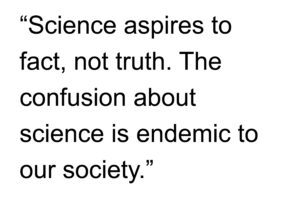 that we require more theoretical conjecture without scientific validation, more opinion and subjective observation – that is, less science – if we want to better understand the organized complexity of our cities.
that we require more theoretical conjecture without scientific validation, more opinion and subjective observation – that is, less science – if we want to better understand the organized complexity of our cities.
Science aspires to fact, not truth. The confusion about science is endemic to our society. You can witness it every time an atheist claims the non-existence of God based on scientific truth. However, science does not aspire to truth. Not only is ‘does God exist?’ unanswerable; it is a question no good scientist would ever seek to answer in scientific terms. It is a question of faith. The value judgment we place on scientific fact does not derive from science itself. It derives from the social, religious or cultural prism through which we view it. Right or wrong is the purview of politicians, philosophers and theologians. There are plenty – perhaps too many – planners and architects analogous to politicians, philosophers and theologians and not enough of the scientific variety. And, too often, those that aspire to science remain mired in the trap of normative theory.

The Modernist hangover lingers in our approach to theory. We require less subjective faith in our conjectures and more objective facts to test them. We persist with models that are colossal failures. When we are stuck in traffic, we feel like rats trapped in a maze. We apply the normative theory to how we model our transportation networks and fail to test the underlining conjecture. We project populations years and decades into the future, yet fail to return to them to test their validity, refine the statistical method and increase the accuracy of future projections. And we hide the scientific failings of our profession behind the mantra, ‘it’s the standard.’ The robust power of GIS to store and organize vast amounts of information into graphical databases is touted as transforming the planning profession. But those that don’t understand science, mistake a tool of scientific method for theory.

We require analytical theory and objective knowledge. If the facts do not support our conjectures, then they need to be discarded. In normative theory, ideas are precious. In analytical theory, they are disposable in favor of a better conjecture on the way to a scientific proof. Scientific method is the means to test and validate or dispose of theory. Our profession and communities have paid a terrible price for the deployment of Modernist theory in our cities. However, quantitative observation and analysis of its failings has offered enlightenment about how to proceed in the future. The work of notable researchers in Europe and the United States are leading the profession towards an analytical theory of the city. In the future, we will be able to deploy scientific method to derive better theory about the physical, social, economic and cultural attributes of the organized complexity of the city. The leap forward will propel planning out of the voodoo orbit of the social sciences and into the objective knowledge of true science. Until then, we need to focus a bit more on getting there and less time raising the specter of dead bogeymen in order to endorse the creation of a new one.
This editorial was written November 28, 2003 in response to a Viewpoint published in the December 2003 issue of the American Planning Association monthly, Planning, which derided science as a reasonable basis for sound planning and cited the experience of Modernism as a reason. This response was never published.



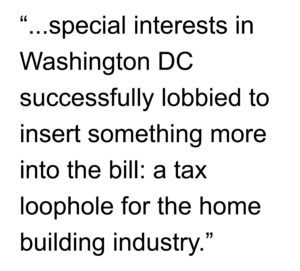 At the beginning of this year, the Democratic Congress passed and President Obama signed into law an extension of unemployment benefits compensation. So far, so good: right? But the special interests in Washington DC successfully lobbied to insert something more into the bill: a tax loophole for the home building industry. The national home builders were able to claim losses over the last 2 years against federal taxes on their corporate profits during the previous 5 years. Basically, this means the federal government is using deficit spending (by borrowing mainly from China, Japan and the United Kingdom) to refund corporate taxes on national home builders’ profits during the boom years to compensate for their losses during the Great Recession. Of course, it will be left to this generation and future generations of unborn Americans to pay this debt.
At the beginning of this year, the Democratic Congress passed and President Obama signed into law an extension of unemployment benefits compensation. So far, so good: right? But the special interests in Washington DC successfully lobbied to insert something more into the bill: a tax loophole for the home building industry. The national home builders were able to claim losses over the last 2 years against federal taxes on their corporate profits during the previous 5 years. Basically, this means the federal government is using deficit spending (by borrowing mainly from China, Japan and the United Kingdom) to refund corporate taxes on national home builders’ profits during the boom years to compensate for their losses during the Great Recession. Of course, it will be left to this generation and future generations of unborn Americans to pay this debt.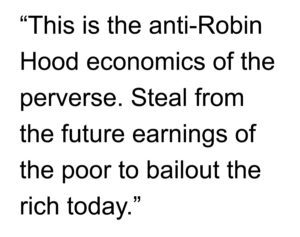 It is a house of cards waiting to fall all over again. And, once again, it will be left to the taxpayers to cover the bills.
It is a house of cards waiting to fall all over again. And, once again, it will be left to the taxpayers to cover the bills.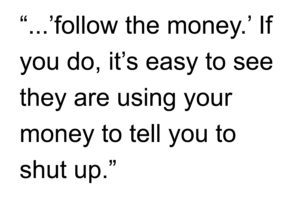 They may have more money (even if a part of it was stolen from you) but there are more of us. Nothing can stop the power of The People when they decide to act (see the Revolutionary War against King George and the British Empire for a relevant example). Let your voices be heard loud and clear this November 2nd. Vote YES on Amendment 4.
They may have more money (even if a part of it was stolen from you) but there are more of us. Nothing can stop the power of The People when they decide to act (see the Revolutionary War against King George and the British Empire for a relevant example). Let your voices be heard loud and clear this November 2nd. Vote YES on Amendment 4.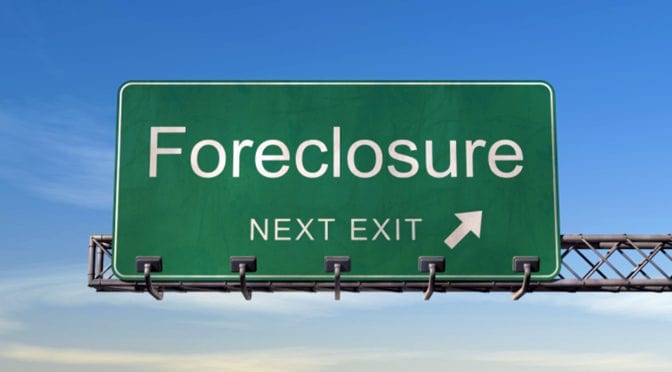
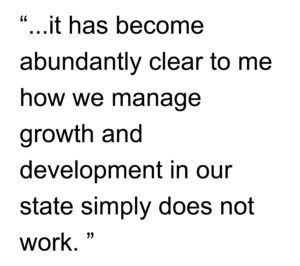 Even those who opposed Amendment 4, openly admit it does not work. And you don’t have to take their word for it either.
Even those who opposed Amendment 4, openly admit it does not work. And you don’t have to take their word for it either.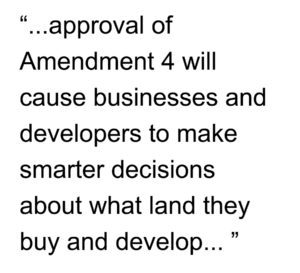 This will lead to smarter growth in Florida.
This will lead to smarter growth in Florida.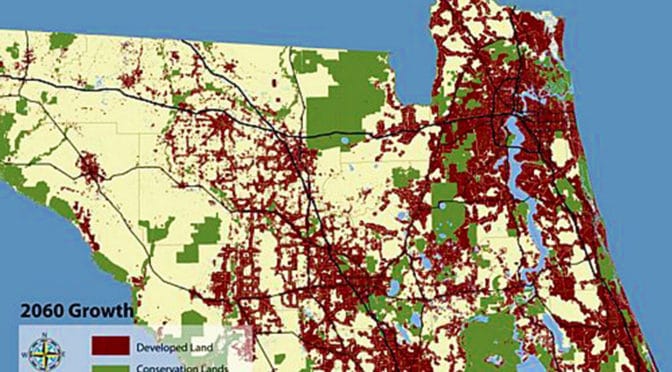
 And this will lead to real change in how Florida develops and grows, for better and smarter development, in the future. Once the inevitable economic recovery appears, our real estate and development businesses will still make money (a lot of money, in fact). But the “this is the way we’ve always done it” business models they have relied for the last 25+ years will have to adapt when the voters approve Amendment 4 this November 2nd. Americans are optimists. We believe a vote can change our world. In 2006 and 2008, we voted to change direction after the Republican Party betrayed its core principles. Now, in 2010, we are once again preparing to vote for unprecedented change after the disappointment of the last 2 years. The media pundits and talking heads are pontificating about “the angry voter”, as represented by the enthusiasm of the Tea Party movement. But people don’t get angry and enthusiastically go out to vote unless they are optimists. The optimist votes because we still believe our vote matters and we can change things for the better. We stubbornly cling to our optimism despite being bombarded by the ‘conventional wisdom’ of cynics who prey on the fear we can never change a corrupt system dominated by moneyed interests, lobbyists and entitled self-serving incumbents (of both parties). I urge you to exercise your optimism by voting Yes on Amendment 4 this November 2nd for a better and smarter Florida.
And this will lead to real change in how Florida develops and grows, for better and smarter development, in the future. Once the inevitable economic recovery appears, our real estate and development businesses will still make money (a lot of money, in fact). But the “this is the way we’ve always done it” business models they have relied for the last 25+ years will have to adapt when the voters approve Amendment 4 this November 2nd. Americans are optimists. We believe a vote can change our world. In 2006 and 2008, we voted to change direction after the Republican Party betrayed its core principles. Now, in 2010, we are once again preparing to vote for unprecedented change after the disappointment of the last 2 years. The media pundits and talking heads are pontificating about “the angry voter”, as represented by the enthusiasm of the Tea Party movement. But people don’t get angry and enthusiastically go out to vote unless they are optimists. The optimist votes because we still believe our vote matters and we can change things for the better. We stubbornly cling to our optimism despite being bombarded by the ‘conventional wisdom’ of cynics who prey on the fear we can never change a corrupt system dominated by moneyed interests, lobbyists and entitled self-serving incumbents (of both parties). I urge you to exercise your optimism by voting Yes on Amendment 4 this November 2nd for a better and smarter Florida.
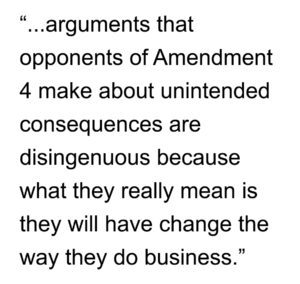 But it is ‘business as usual’ that is the problem. Approval of Amendment 4 will lead to businesses making better and smarter decisions about what land is best to develop rather than what is the cheapest land to purchase. The most crucial calculations about a development are made long before it enters the regulatory process and approval of Amendment 4 will alter those calculations.
But it is ‘business as usual’ that is the problem. Approval of Amendment 4 will lead to businesses making better and smarter decisions about what land is best to develop rather than what is the cheapest land to purchase. The most crucial calculations about a development are made long before it enters the regulatory process and approval of Amendment 4 will alter those calculations.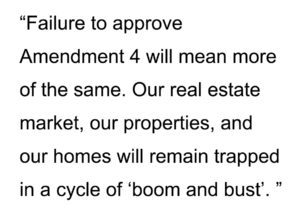 More importantly, the solution opponents of Amendment 4 are offering is ‘more of the same’. They are poised, even eager, to make the same mistakes all over again because that is “how we’ve always done it”. But ‘more of the same’ is not a solution. Voting YES for Amendment 4 this November 2nd is a step in the right direction for a better Florida.
More importantly, the solution opponents of Amendment 4 are offering is ‘more of the same’. They are poised, even eager, to make the same mistakes all over again because that is “how we’ve always done it”. But ‘more of the same’ is not a solution. Voting YES for Amendment 4 this November 2nd is a step in the right direction for a better Florida.